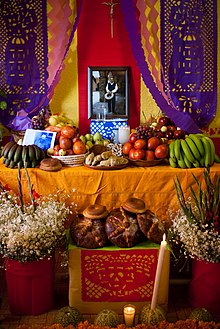Portal:Religion
The Religion Portal
Religion is a range of social-cultural systems, including designated behaviors and practices, morals, beliefs, worldviews, texts, sanctified places, prophecies, ethics, or organizations, that generally relate humanity to supernatural, transcendental, and spiritual elements—although there is no scholarly consensus over what precisely constitutes a religion. Different religions may or may not contain various elements ranging from the divine, sacredness, faith, and a supernatural being or beings. (Full article...)
 Vital article
Vital article
Sunni Islam (/ˈsuːni/; Arabic: أهل السنة, romanized: Ahl as-Sunnah, lit. 'The People of the Sunnah') is the largest branch of Islam, followed by 85–90% of the world's Muslims, and simultaneously the largest religious denomination in the world. Its name comes from the word Sunnah, referring to the tradition of Muhammad. The differences between Sunni and Shia Muslims arose from a disagreement over the succession to Muhammad and subsequently acquired broader political significance, as well as theological and juridical dimensions. According to Sunni traditions, Muhammad left no successor and the participants of the Saqifah event appointed Abu Bakr as the next-in-line (the first caliph). This contrasts with the Shia view, which holds that Muhammad appointed his son-in-law and cousin Ali ibn Abi Talib as his successor. (Full article...)
 Did you know (auto-generated)
Did you know (auto-generated)
- ... that Freedom of Religion South Africa filed an unsuccessful lawsuit to keep child spanking legal?
- ... that the capital of South Ossetia once had more Jews than Ossetians?
- ... that the nonconformist minister Ichabod Chauncey was banished from England under the Religion Act 1592 and spent two years in exile in Holland where he published a defence of his actions?
- ... that a religious community is a group of people who practice the same religion, but do not have to live together?
- ... that Gherardo Gambelli, the incoming archbishop of Florence, served as a prison chaplain in Chad for over a decade?
- ... that Musa va 'Uj depicts figures from all three Abrahamic religions?

Several attempts at a Franco-Mongol alliance against the Islamic caliphates, their common enemy, were made by various leaders among the Frankish Crusaders and the Mongol Empire in the 13th century. Such an alliance might have seemed an obvious choice: the Mongols were already sympathetic to Christianity, given the presence of many influential Nestorian Christians in the Mongol court. The Franks—Western Europeans, and those in the Levantine Crusader states—were open to the idea of support from the East, in part owing to the long-running legend of the mythical Prester John, an Eastern king in an Eastern kingdom who many believed would one day come to the assistance of the Crusaders in the Holy Land. The Franks and Mongols also shared a common enemy in the Muslims. However, despite many messages, gifts, and emissaries over the course of several decades, the often-proposed alliance never came to fruition. (Full article...)


































































